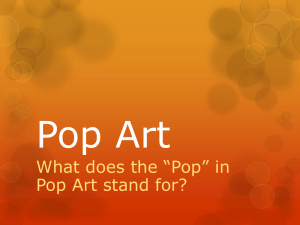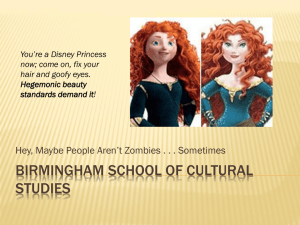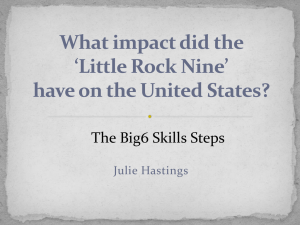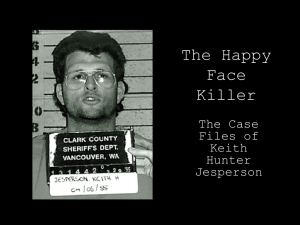Pop Music & Society
advertisement
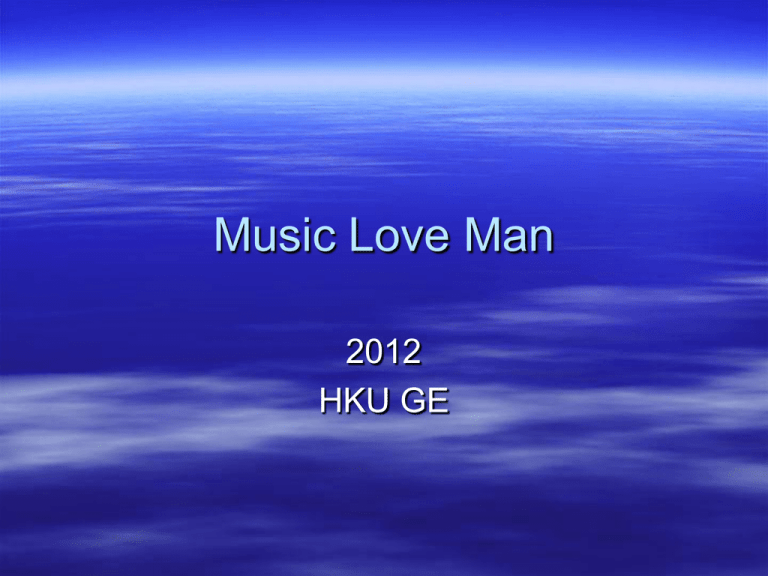
Music Love Man 2012 HKU GE wongchichung@mac.com http://www.facebook.com/chichung.wong1 黃志淙 博士 aka chi chung’s choice AcadeMediArTradExperience #1 Sharing Music : anyone can be a DJ Performing music Sharing music Recording music Disseminating music Selling music Promoting music Building music… #2 Music Travelogue : Go with the Beats “Music is the soundtrack to our lives…” (Tracy Thorn, ebtg) #3 Curating Music : Trend-setting and Taste-making #4 Living Music Producers Stage Managers Technicians Promoters: Poster designers… Performers Hosts Audience Credit Course Description As the study of popular music is multidisciplinary in nature, this course draws upon a range of academic disciplines including sociology, media studies, cultural studies, and literary studies. Different approaches to popular music studies will be adopted throughout the programme. This will provide students with the knowledge and skills necessary to critically evaluate the role of popular music in contemporary society. Outline I. Introduction: Defining Popular Music II. Approaches to Popular Music Studies III. The Popular Music Industry IV. Popular Music and Social Change V. Popular Music, Meanings and Pleasures VI. Popular Music, Place and Identity VII. Popular Music and Media Policy VIII. Globalization and Its Impacts on Popular Music Industry References Bennett, Andy et al eds. The Popular Music Studies Reader. London & New York: Routledge, 2006 Frith, Simon eds. The Cambridge Companion to Pop and Rock. New York: Cambridge University Press, 2001. Frith, Simon. Taking Popular Music Seriously: Selected Essays. Aldershot & Burlington: Ashgate, 2007. Hamm, Charles. Putting Popular Music in Its Place. New York: Cambridge University Press, 1995. Hesmondhalgh, David. The Cultural Industries. (2nd edn). London: Sage, 2007. Hesmondhalgh, David. ‘Music, Digitalisation and Copyright’, in Peter Golding and Graham Murdock (eds.) Understanding Digital Dynamics, New York: Hampton Press, 2008. Hesmondhalgh, David & Negus, Keith eds. Popular Music Studies. London: Arnold, 2002. Horner, Bruce & Swiss, Thomas eds. Key Terms for Studying Popular Music. Malden & Blackwell, 1999. Negus, Keith. Producing Pop: Culture and Conflict in the Popular Music Industry. London: Edward Arnold, 1992. Negus, Keith. Popular Music in Theory. Hanover: University of New England, 1996. Negus, Keith Music Genres and Corporate Cultures. London: Routledge, 1999. Shuker, Roy. Understanding Popular Music. London & New York: Routledge, 2001. Wong, Chi Chung. Making and Using Pop Music in Hong Kong. HKU. 1997. Wong, Chi Chung. The Working of Pop Music Culture in the Age of Digital Reproduction. HKU. 2010. 朱耀偉:《香港流行歌詞研究:七十年代中期 至九十年代中期》香港:三聯書店,1998。 朱耀偉:《光輝歲月:香港流行樂隊組合研 究》香港:匯智出版,2000。 朱耀偉 , 黃志華 :《香港歌詞導賞》香港:匯 智出版,2009。 曾慧佳:《從流行歌曲看台灣社會》台北:桂 冠圖書,2000。 黃志淙:《流聲》香港:民政事務局,2007。 黃志華:《粵語流行曲四十年》香港:三聯書 店,1990。 黃志華 :《早期香港粵語流行曲》香港:三聯 書店,2000。 黃霑:《粵語流行曲的發展與興衰:香港流行 音樂研究1949-1997》香港:香港大學亞洲研 究中心博士論文,2003。 Methodology Cultural Studies 1. Textual analysis 2. Production – Music Industry 3. Audience survey Comparative Study West x East Rock & Pop Canto-Pop What is Pop Music? Definitions Production : by popular idols/artists Vs niche musicians : by the music industry Vs DIY/Indie Media : popularized by the mass media Vs viralized by the new media/fan-based/crowdsourcing Text : melodies loved/shared by the “mass” : message/lyrics echoed by the “people” T.W. Adorno Frankfurt School Critical Theory Commodification Pseudo-individualisation Superficial and false pleasure British School Simon Frith The Sociology of Rock (1978)… Music and Copyright (1993) The Cambridge Companion to Pop and Rock (2001) Brian Longhurst Popular Music and Society (1995) Production – Text – Audience Richard Middleton Studying Popular Music (1990) Textual Analysis / Musicology David Hesmondhalgh Keith Negus Popular Music Studies (2002) Popular Music in Theory (Negus,1996) Music Genres and Corporate Cultures (Negus, 1999) Producing Pop (Negus, 1992) Hesmondhalgh and Negus : four key themes of pop music studies 1. Musical meaning ; 2. Popular music audiences; 3. Music industries and production; 4. Place (time-space processes or globalization) Pop Music History : from gramophone to MP3 Music Industry : from Majors to Indies : talents, recording, marketing, promotion, distribution, retailing… Production Creative Artists Globalisaiton/Localisation/Glocalisation Digitalisation Text - West Rock ‘n’ Roll 1955 The Beatles, Folk 1960s Progressive Rock, Disco, Punk 1970s MTV, Syn-pop, New Romantics, Hip Hop 1980s Grunge, Brit-Pop, Teen Idols… 1990s Text - HK Pop bands 1960s Canto-Pop, TV Theme-songs 1970s Mega-Stars, Band Wave 1980s 4 Heavenly Kings, Indies 1990s Singer-songwriters, Creative Clans 2000s Audience Fandom Passive…Participatory, Active… Digitalisation & Empowerment

